Recent Water Damage Posts
Reviving Your Electronics: How to Handle Water-Damaged Devices
10/16/2024 (Permalink)
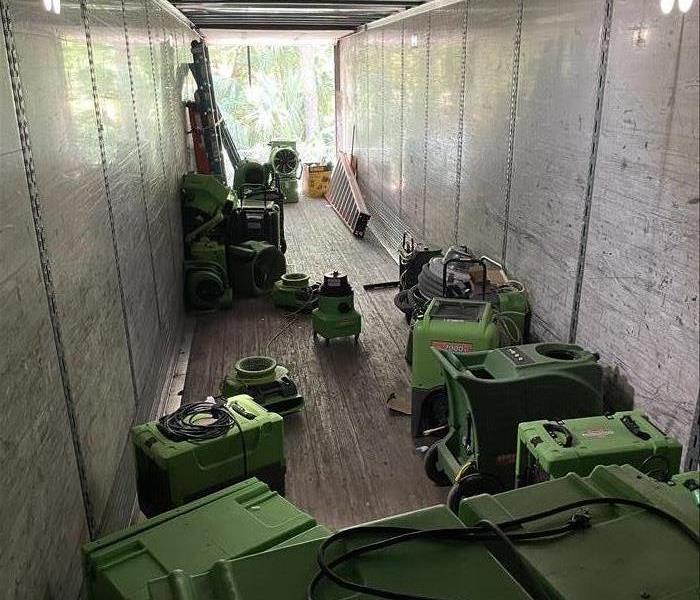 Here’s a guide on how to handle water-damaged electronics to give them the best chance of recovery.
Here’s a guide on how to handle water-damaged electronics to give them the best chance of recovery.
When water damage strikes, it's not just your floors and walls that are at risk—your electronics can also suffer. From smartphones to computers, water-damaged devices are all too common, with some statistics estimating that over 20 percent of electronic failures are caused by water damage and corrosion. If you find yourself facing this problem, don’t panic. Here’s a guide on how to handle water-damaged electronics to give them the best chance of recovery.
Assess the Situation: Safety First
Before attempting to save your water-damaged device, make sure the environment is safe. If the device was plugged in when it got wet, avoid touching it. Water and electricity are a dangerous combination, so always disconnect the power first. Once it’s safe to handle, gently remove the device from the water source.
Do Not Turn It On
It may be tempting to check if your device is still working by turning it on, but resist the urge. Powering on water-damaged electronics can cause short circuits and further damage. Instead, leave the device off until you’re sure it’s completely dry.
Dry the Exterior
Start by drying off the exterior of the device. Use a soft, absorbent cloth or towel to gently wipe away any moisture. Avoid shaking or tilting the device excessively, as this could cause water to spread to internal components.
Remove Batteries and External Parts
If possible, remove any removable parts like batteries, SIM cards, and memory cards. This will help the drying process and prevent further damage. For devices where the battery isn’t easily accessible, consider taking it to a professional rather than attempting to open it yourself.
Air Dry: Patience is Key
The best method for drying water-damaged electronics is to let them air dry. Place the device in a well-ventilated, dry area, ideally with low humidity. Avoid using heat sources such as hair dryers or ovens, as these can warp or damage the internal components.
For small devices like smartphones, placing them in a bag of uncooked rice can help draw out moisture. However, this method isn’t foolproof and is not recommended for larger devices or electronics with more sensitive components.
Consider Professional Restoration
While some water-damaged electronics may recover with DIY methods, others may require professional restoration services. SERVPRO® specializes in restoring water-damaged electronics, using advanced techniques to carefully dry and clean internal components. Professionals have access to tools like desiccant drying chambers and deionized water, which are more effective than home remedies.
Don’t Wait Too Long
The longer water sits inside your device, the more damage it can cause. If your device has been submerged or exposed to water for an extended period, the risk of corrosion increases. Swift action is crucial in minimizing damage.
Final Thoughts
Water-damaged electronics don’t always mean the end of your device. By following these steps and, when necessary, seeking professional help, you can increase the chances of recovery. Whether it’s a smartphone, computer, or other valuable equipment, remember that time is of the essence. If you’re unsure about how to proceed, SERVPRO is Here to Help® with expert restoration services that can bring your devices back to life.
Contact SERVPRO Today
If you’re dealing with water-damaged electronics and need assistance, SERVPRO is just a call away. Our team of professionals is trained to handle all types of water damage, ensuring that your property and devices are restored to their full functionality. Contact us today for reliable and efficient water damage restoration services.
How to Get Rid of Musty Smells In Your House
7/17/2024 (Permalink)
A musty smell in your home can be quite unpleasant and often signals underlying issues. Fortunately, getting rid of musty odors is a manageable task with a few strategic steps. As experts in restoration and cleaning, SERVPRO® is here to guide you through the process to ensure your home smells fresh and clean once again.
Identify the Source
Before you can eliminate musty odors, it's crucial to pinpoint their origin. Common sources include damp basements, hidden mold growth, or water leaks. Check areas that are prone to moisture, such as bathrooms, kitchens, basements, and laundry rooms. Look for signs of water damage or mold, which often accompany musty smells.
Dry Out the Area
Moisture is often the primary cause of musty odors, so drying out the affected area is essential. Use dehumidifiers to reduce humidity levels, particularly in damp areas like basements and bathrooms. Ensure proper ventilation by opening windows and using exhaust fans to help circulate air and speed up the drying process.
Clean and Disinfect
Once the area is dry, the next step is to clean and disinfect. Use a mixture of water and white vinegar or a commercial cleaner to scrub surfaces that may harbor mold or mildew. Pay special attention to hidden spots such as under sinks, behind appliances, and inside closets. For carpets and upholstery, consider using a steam cleaner to penetrate deep into fibers and eliminate any trapped odors.
Use Odor Absorbers
To further neutralize musty smells, place odor absorbers around your home. Baking soda, activated charcoal, and white vinegar are excellent natural options. Simply place bowls of these substances in areas where odors are present. They will help absorb and neutralize lingering smells over time. Additionally, using air purifiers with HEPA filters can help remove airborne particles that contribute to odors.
Inspect and Maintain HVAC Systems
Your HVAC system can also be a culprit in spreading musty odors throughout your home. Regularly change air filters and have your HVAC system inspected and cleaned by professionals. Duct cleaning services can remove dust, mold, and other contaminants that contribute to musty smells.
Regular Maintenance and Prevention
Preventing musty odors requires regular home maintenance. Ensure your home is well-ventilated, particularly in high-moisture areas. Regularly inspect and repair any leaks in your plumbing or roof to prevent water damage. Consider using moisture barriers in basements and crawl spaces to reduce humidity levels. Keep your home clean and dry to prevent mold and mildew from developing.
Seek Professional Help When Needed
If the musty smell persists despite your efforts, it might be time to seek professional assistance. SERVPRO offers comprehensive cleaning and restoration services to address the underlying issues causing musty odors. Our team of experts can thoroughly inspect your home, identify problem areas, and provide effective solutions to eliminate odors and prevent future occurrences.
By following these steps, you can successfully rid your home of musty smells and create a more pleasant living environment. For more expert advice or assistance with odor removal, contact SERVPRO today. We are here to help you restore and maintain a fresh, clean home.
Water Damage in Commercial Kitchens: Recovery and Clean-Up Tips
6/12/2024 (Permalink)
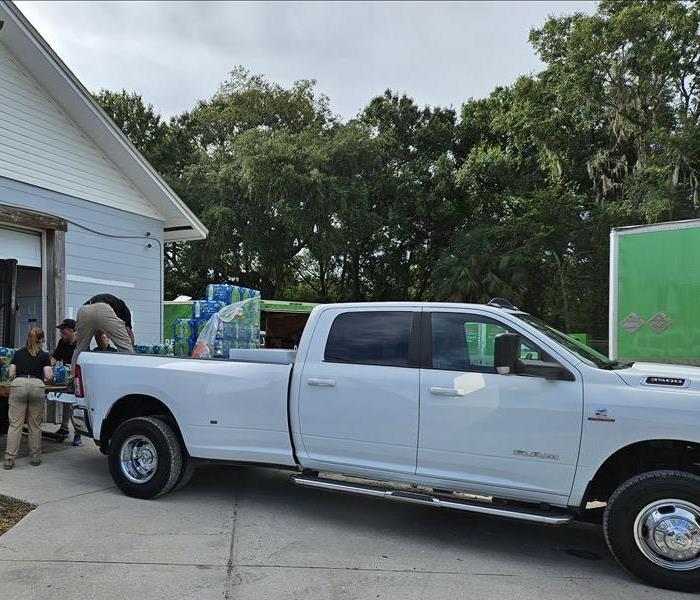 With the right knowledge and prompt action, you can minimize the downtime and get your commercial kitchen up and running again.
With the right knowledge and prompt action, you can minimize the downtime and get your commercial kitchen up and running again.
Accidents happen, and in the fast-paced environment of a commercial kitchen, water damage is a common occurrence. Whether it's a burst pipe, a leaky dishwasher, or flooding from heavy rain, water damage can disrupt your business operations and lead to costly repairs. However, with the right knowledge and prompt action, you can minimize the downtime and get your commercial kitchen up and running again.
Identify the Source of the Water Damage
The first step in addressing water damage is to identify the source. Quickly locate and shut off the water supply to prevent further damage. Common sources of water damage in commercial kitchens include faulty plumbing, damaged appliances, and weather-related incidents. By identifying the source, you can better understand the extent of the damage and take appropriate action.
Prioritize Safety
Before entering the affected area, make sure it is safe to do so. If there are any electrical appliances, turn off the power immediately to avoid the risk of electrocution. In case of severe flooding, it may be necessary to evacuate the premises until professional help arrives.
Contact a Professional Commercial Restoration Service
Commercial water damage requires professional expertise to ensure thorough and efficient recovery. Contact a reputable commercial restoration service like SERVPRO® as soon as possible. SERVPRO specializes in commercial water damage restoration and can help you with the cleanup process, minimizing the impact on your business.
Document the Damage and Notify Insurance
Take photos and videos of the water damage before any restoration work begins. This documentation will be useful when filing an insurance claim. Notify your insurance company promptly to begin the claim process and ensure that you have all the necessary paperwork in order.
Remove Standing Water
If it is safe to do so, begin the water extraction process to remove standing water from the affected areas. Use mops, buckets, or wet vacuums to remove as much water as possible. The faster you can remove the water, the lower the risk of secondary damage, such as mold growth.
Dry and Dehumidify
After water extraction, it is crucial to thoroughly dry the affected areas using industrial-grade fans and dehumidifiers. This step is essential to prevent the growth of mold and mildew, which can pose health risks to occupants and cause further damage to your commercial kitchen.
Clean and Sanitize
Once the affected areas are dry, cleaning and sanitization are necessary to ensure a safe and hygienic environment. Use commercial-grade cleaning products to remove any remaining contaminants and bacteria. Pay special attention to hard-to-reach areas, such as corners and crevices, where mold can easily thrive.
Repair and Restore
Once the cleanup process is complete, it's time to repair and restore any damaged structures, equipment, or fixtures. A professional commercial restoration service like SERVPRO® will have the expertise and resources to handle repairs efficiently, getting your commercial kitchen back to its original state.
Prevention is Key
To minimize the risk of future water damage, it's essential to implement preventative measures. Regularly inspect plumbing systems, appliances, and the building's exterior for any signs of damage or deterioration. Promptly address any leaks or issues to prevent them from escalating into larger problems.
In conclusion, water damage in commercial kitchens can disrupt your business and cause significant financial loss. By following these recovery and clean-up tips, along with the assistance of a professional commercial restoration service like SERVPRO, you can mitigate the damage and restore your commercial kitchen quickly. Remember, acting promptly is crucial in preventing secondary issues like mold growth. Don't hesitate to reach out to expert help for efficient and reliable commercial water damage restoration services.
5 Tips to Master Water Extraction
1/24/2024 (Permalink)
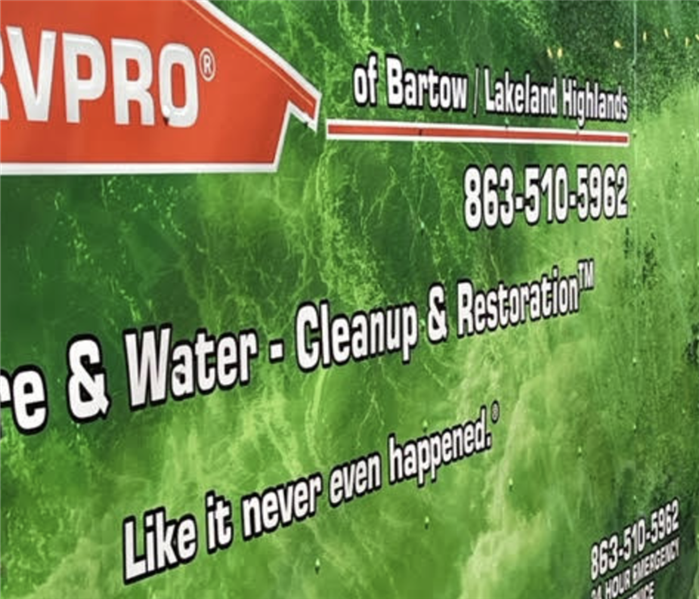 By partnering with our SERVPRO® team, homeowners and businesses can minimize damage and facilitate a faster restoration process!
By partnering with our SERVPRO® team, homeowners and businesses can minimize damage and facilitate a faster restoration process!
Water damage incidents can be overwhelming. To mitigate potential harm to properties, quick and effective water extraction is needed. At SERVPRO®, we've compiled five essential tips for successful water extraction that can assist homeowners and businesses in navigating water emergencies.
1. Act Quickly and Safely
Time is critical when addressing water damage. Act quickly to prevent further damage and other potential hazards. Prioritize safety by shutting off electrical sources and ensuring a safe environment before initiating any water extraction.
2. Assess the Situation
Before initiating water extraction, assess the extent and severity of the damage. Identify the water source and categorize the water damage (clean water, grey water, or black water) to determine the appropriate extraction and restoration methods.
3. Utilize Proper Equipment
Invest in or hire professional-grade equipment suitable for water extraction. Tools like pumps, wet vacuums, dehumidifiers, and air movers are essential for efficient water removal and drying processes. Ensure proper training or professional assistance for using this equipment.
4. Begin Extraction and Drying Immediately
Commence water extraction as soon as possible to prevent further damage and mold growth. Remove standing water using pumps or wet vacuums, and employ dehumidifiers and air movers to facilitate quick drying. Focus on thorough extraction to prevent lingering moisture.
5. Seek Professional Assistance
For extensive or severe water damage situations, seek professional help from restoration experts like SERVPRO of Bartow/Lakeland Highlands. Trained professionals possess the expertise, equipment, and experience necessary for comprehensive water extraction and restoration, ensuring thorough cleanup and minimizing future issues.
Why Trust SERVPRO® for Water Extraction?
- Swift Response: Our 24/7 emergency service ensures immediate response to mitigate water damage, utilizing advanced equipment for efficient extraction and restoration.
- Expertise and Efficiency: With extensive experience in water damage restoration, our professionals deliver effective solutions, ensuring thorough extraction and preventing further damage.
- Comprehensive Restoration: We offer complete restoration services, not just extraction, ensuring properties are restored to their pre-damaged state efficiently.
Successful water extraction is crucial in mitigating the impact of water damage. By following these tips and partnering with professionals like our SERVPRO® team, homeowners and businesses can navigate water extraction effectively, minimizing damage and facilitating a faster restoration process!
Protecting Your Important Documents from Water Damage
10/9/2023 (Permalink)
Living in the beautiful state of Florida comes with its fair share of water-related risks, from heavy rains and flooding to the occasional hurricane. Protecting your important documents from potential water damage should be a priority for every Florida resident. In this blog, we'll explore practical steps you can take to safeguard your valuable documents and keep them safe and dry.
Identify and Prioritize Important Documents
Start by identifying which documents are crucial and need protection. These may include birth certificates, passports, Social Security cards, wills, insurance policies, property deeds, and financial records. Make a list of these documents to ensure nothing important is overlooked.
Utilize Waterproof Containers
Invest in waterproof containers or document bags designed to withstand water exposure. These containers are essential for protecting your documents from unexpected water disasters. Store your important papers in these containers to create a reliable barrier against water damage.
Create Digital Copies
In addition to physical copies, consider digitizing your important documents. Scan them and store them on a secure cloud service or an external hard drive kept in a waterproof container. This ensures that even if the physical documents are damaged, you have accessible digital backups.
Secure a Safe or Safety Deposit Box
For an extra layer of protection, consider storing your most critical documents in a home safe or a safety deposit box at your bank. These secure options can safeguard your valuables against both water and theft.
Regularly Update and Review Documents
As your life circumstances change, so do your important documents. Regularly update your documents and review them to ensure they reflect your current situation. This includes updating beneficiaries, addresses, and contact information.
Consult with a Professional Restoration Service
In the unfortunate event of water damage to your important documents, contact a professional restoration service like SERVPRO®. Our experts are trained to restore and recover water-damaged documents, photographs, and other valuable items.
Protecting your valuable documents from water damage in Florida is a proactive step toward safeguarding your future. By following these tips, you can ensure that your important papers remain safe, secure, and accessible, even in the face of unexpected water disasters. For expert assistance with water-damaged documents or property, reach out to SERVPRO®. We're here to help you through challenging times and restore what matters most.
Is Your Water Heater Making Noises? Understanding and Addressing Common Causes
7/17/2023 (Permalink)
Your water heater is an essential appliance that provides hot water for various household tasks. While it generally operates quietly in the background, you may occasionally notice unusual noises coming from your water heater. These sounds can be concerning and may indicate underlying issues that require attention. In this blog post, we will explore the common causes of water heater noises, their potential implications, and the steps you can take to address them effectively.
Sediment Buildup
One of the primary reasons for water heater noises is sediment buildup. Over time, minerals and debris can accumulate at the bottom of the tank, creating a layer of sediment. When the burner or heating element heats the water, it bubbles through the sediment, resulting in popping or rumbling sounds. Regular maintenance, such as flushing the tank to remove sediment, can help alleviate this issue.
Expansion and Contraction
As water heats up, it expands and causes the tank to expand and contract. This expansion and contraction process can produce cracking or popping sounds, especially if the water heater is inadequately secured or the temperature is set too high. Ensuring proper installation and adjusting the temperature settings within the recommended range can help minimize these noises.
Thermal Expansion
In closed plumbing systems, thermal expansion occurs when heated water expands and increases pressure within the pipes. This can lead to a banging or knocking noise, known as water hammer. Installing an expansion tank or pressure-reducing valve can help mitigate the effects of thermal expansion and reduce associated noises.
Faulty Heating Element or Burner
A malfunctioning heating element or burner can cause popping, sizzling, or hissing sounds. This could be due to a faulty component or an accumulation of sediment or mineral deposits on the heating element or burner. In such cases, it is advisable to have a professional plumber inspect and repair the water heater to ensure its proper functioning.
Loose or Damaged Components
Loose or damaged components within the water heater, such as valves, pipes, or heating elements, can create rattling, banging, or clanking noises. Tightening loose connections or replacing damaged parts can help eliminate these sounds and prevent further issues.
If your water heater is making unusual noises, it's important not to ignore them. By understanding the common causes of water heater noises and taking appropriate action, you can address the underlying issues and prevent potential damage or system failure. Regular maintenance, including flushing the tank, adjusting temperature settings, and seeking professional assistance when needed, can help ensure the efficient and quiet operation of your water heater. Remember, if you are unsure about the cause or unable to resolve the issue yourself, it is always advisable to consult a qualified plumber to diagnose and address the problem effectively.
Understanding Black Water: The Potential Hazards after Water Damage
6/18/2023 (Permalink)
After a water damage event, property owners encounter various types of water damage, each requiring specific mitigation strategies. One of the most concerning categories is "black water." In this blog, we will explore what black water is, its potential hazards, and why immediate action is crucial when dealing with this type of water damage.
What is Black Water?
Black water refers to water that is heavily contaminated and poses significant risks due to the presence of harmful substances. It typically originates from sewage backups, toilet overflows, flooding from rivers or streams, or water damage that have been left untreated for an extended period. Black water is classified as Category 3 water damage, the most severe category, as it contains pathogens, chemicals, and other contaminants that can cause serious illness or infection.
Potential Hazards of Black Water
Risks: Black water may contain bacteria, viruses, parasites, and other microorganisms that can lead to severe issues. Direct contact, ingestion, or inhalation of black water can put individuals at risk.
Structural Damage: Black water is highly destructive and can cause significant damage to the structure of a building. It can weaken foundations, compromise drywall, damage electrical systems, and deteriorate furniture and other porous materials.
Mold Growth: Black water provides an ideal environment for mold growth due to its high moisture content and nutrient-rich composition. Mold can proliferate rapidly, leading to further damage and posing additional risks.
Odor and Air Quality: The presence of black water often results in foul odors and poor indoor air quality. The noxious smell can permeate the affected area and may be challenging to eliminate without proper restoration.
Immediate Action is Crucial
When faced with black water damage, immediate action is paramount. Here's why:
Health and Safety: Promptly addressing black water damage mitigates the health risks associated with exposure to harmful contaminants, ensuring the safety of occupants and restoration professionals.
Damage Mitigation: Acting quickly helps prevent further structural damage and minimizes the chances of secondary issues such as mold growth and extensive material deterioration.
Restoration Efficiency: Swift remediation reduces the overall restoration time, minimizing disruption to business operations or the daily lives of affected individuals.
Insurance Compliance: Many insurance policies require prompt reporting and mitigation of water damage to maintain coverage. Timely action ensures compliance with insurance requirements, facilitating the claims process.
Understanding the potential hazards of black water is crucial for disaster restoration professionals and property owners alike. By recognizing its contaminated nature and the associated risks, immediate action can be taken to protect individuals, prevent further damage, and restore affected areas promptly. If faced with black water damage, it is vital to engage professional disaster restoration services equipped with the expertise, equipment, and resources to handle the situation safely and effectively.
Hiring a Certified Water Specialist
3/16/2023 (Permalink)
Water damage restoration is a specialized field that requires extensive training and experience. This means you should only hire a certified water damage specialist to help with your restoration job. However, there are some things you need to know before hiring a professional. The most important thing to remember is not all companies are equal when it comes to their ability to handle water loss situations. Some companies may try to sell you more products or services than what's necessary for the job at hand because they're looking for ways of increasing their profit margins by charging extra fees on top of the initial cost of doing business with them in the first place.
Understanding the Loss.
A certified water damage restoration expert can help you understand the full extent of the damage. They will be able to give you an accurate estimate of how much water was lost, what caused it and what steps need to be taken next.
Certified water damage experts are trained to be impartial in their assessment of the damage. This means that they can help you better understand the full extent of your situation, as well as what it will take to restore your home or business.
If you're facing a large restoration project, it's important for you to understand all of your options so that you can make an informed decision about how best to proceed. Your certified expert will be able to provide this information and guide you through every step along the way.
Hazardous Materials.
Certified experts are trained to handle water damage situations, which means they know how to properly remove and dispose of hazardous materials. For example, if you have standing water in your home, the certified expert will know how to identify potential hazards like mold and mildew before beginning any cleanup process. If there is any visible mold or mildew growth on surfaces such as ceilings or walls, this must be removed with care so that it doesn't spread throughout your home or cause further damage,
Certified technicians also use special equipment like HEPA vacuums that filter out bacteria as they suck up moisture from carpeting and hardwood floors--keeping air quality inside yours safe for breathing!
Advanced Equipment
A certified professional will speed up the restoration process because they have access to advanced equipment and products that are specially designed for drying out homes and businesses. Certified water damage restoration technicians are trained in using this equipment, so they can use it effectively. They also know how to properly use products like dehumidifiers and air movers, which can help dry out your home faster than if you tried it yourself.
When you hire a certified specialist, you're also hiring someone who has been trained to handle liability issues related to dealing with water damage professionals. By signing your property over to a professional repair company or individual, you are taking on the risk of being held legally responsible for any damage that may occur during the cleanup process.
If you have experienced any type of water loss in your home or business, it's important that you hire a certified water damage restoration expert. Certified experts have the right training and equipment to handle water damage situations. They are also trained to handle hazardous materials such as mold and mildew, which are common when dealing with large amounts of moisture. Give SERVPRO a call at the first sign of water damage in your home or business.
Unexpected Hazards of a Leaky Roof
12/22/2022 (Permalink)
Unexpected Hazards of a Leaky Roof
Water damage is a major concern for homeowners. It may seem like an ever-present problem, but the truth is that it can come from any number of sources in your home. Your roof is one of the most vulnerable areas for water damage, and it’s one of the easiest to overlook or neglect. When you have a leaky roof, it can cause problems throughout your home—especially if you don't catch it in time. But even if you do know about the leaky roof before any serious damage starts to happen, there are still some things we want you to be aware of when dealing with this type of situation so that you don’t find yourself worse off than before:
What Does Moisture Do to a Home’s Interior Surfaces?
A leaky roof can cause serious damage to your home. In fact, moisture can lead to mold and mildew growth, wood rot, peeling paint, and carpeting/flooring deterioration. If the water is not fixed quickly enough, it could also cause serious drywall damage.
What effect does a leaky roof have on the rest of my home?
Even if you don't have a leaky roof, it's important to know how to detect and fix any damage that may have occurred. Leaks can cause water damage throughout your home—from the floors and carpets to the walls and ceilings. This can lead to serious problems such as mold growth and rot in wooden structures, or even electrical wiring fires if left unchecked.
A leaking roof can also have an effect on ceiling-mounted lights or fans installed in your home. Water that finds its way into these areas could cause them to fail suddenly without warning, leaving you without light or air conditioning when you need it most.
How Does Leaking Water Damage Your Home?
Leaking water is a major problem in the United States. When you think of a leaky roof, you probably picture rainwater coming through your ceiling.
If water sits for long periods of time, mold and mildew can grow on wood and drywall surfaces — and even behind walls! Wood will rot from moisture if left untreated; drywall will crack as it ages; electrical components can short out due to corrosion; structural supports may be weakened by too much weight on them. All these things make for costly repairs!
A leaking roof can cause a lot of problems in your home. Water damage is only one of them.
You may have heard that a leaking roof can cause a lot of damage to your home. The truth is, this is only part of the story. Water damage isn't the only problem you might face if you have a leaky roof—mold growth is also an issue that needs to be addressed immediately.
Mold can ruin more than just your furniture and carpeting; it can damage electrical components, plumbing systems, and even structural elements of your house as it spreads throughout your home’s interior. And while some species of mold are harmless—and even beneficial when they're in small quantities—others can cause serious problems for infected houses or buildings.
Water damage is only one of the hazards of a leaky roof. It can lead to mold growth and other complications that are much more expensive to repair. If you have noticed water in your home, it’s important that you contact an expert immediately.
3 Essential Things To Know About Category 3 Water Damage
6/9/2022 (Permalink)
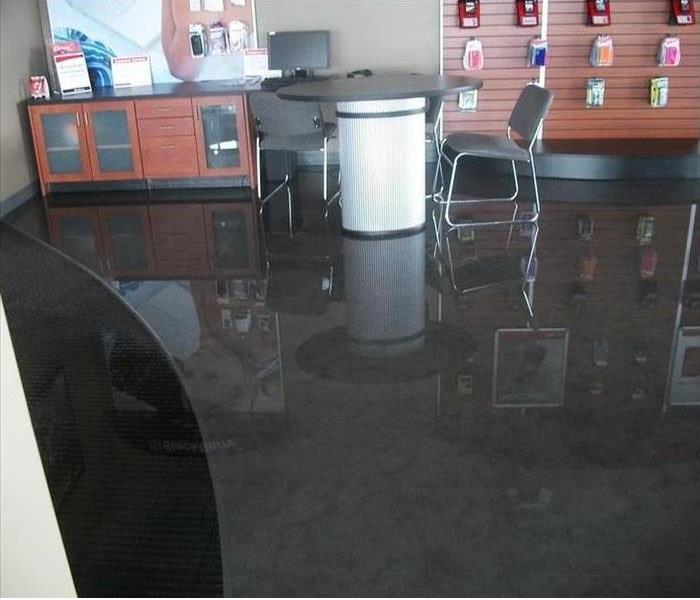 A leak in the roof at this Verizon store flooded the showroom and other portions of the store.
A leak in the roof at this Verizon store flooded the showroom and other portions of the store.
Three Things You Should Know About Category 3 Water Damage
Water damage can inflict itself in many ways and to various degrees. The most alarming type of water damage is Category 3, or black water. This contaminant-filled water can not only cause destruction to properties but pose health risks as well. Here are the three major things your know in the event black water is found in your Highland City, FL, property.
1. It Is Highly Contaminated
Water damage ranges from Category 1, or clean water, to grossly unsanitary black water. Category 3 water is filled with biohazards like fungi, viruses, and bacteria, as well as chemical toxins. It's important to note that while Category 2 damage, or gray water, also features a high level of contaminants, it does not pose as much of a health threat upon exposure. However, gray water that has gone untreated for too long can develop more bacteria and be re-categorized as black water.
2. Flood Water Is a Common Source
Buildings that face flood damage after a storm are actually dealing with black water. Rainwater itself is not contaminated, however, groundwater flooding or rising seawater contains a collection of harmful bio elements. A sewage backup is another common source of black water, so always consider your health and safety should a toilet overflow with fecal matter.
3. Water Damage Specialists Should Always Handle Cleanup
When it comes to treating Category 3 water, rely on water damage mitigation professionals to get the job done. These highly-trained experts can properly handle the extraction of flood water and dry out the affected space. Black water's dangerous properties require extensive sanitizing which a cleanup company will handle after the removal of water. Any structural damage that remains will then be taken care of as needed.
Category 3 water comes highly contaminated so be wary of any buildup of flood water or wastewater and leave the cleanup to professionals.
Plumbing Problems That Could Lead to a Toilet Overflow
5/26/2022 (Permalink)
Plumbing Issues That May Cause A Toilet Overflow
When the plumbing system in your home is working perfectly, you won't need to worry about facing a sewage cleaning problem. However, things can and do go awry, which could lead to contaminated water on the floor of your bathroom. This can happen for several reasons, the most common being a plugged toilet. When the water cannot go down, it will go up and overflow the commode. Clearing the clog, usually with just a plunger, takes care of the problem.
Sometimes, toilet water seeps out from the base as the result of an old or faulty seal. This can also be fixed rather quickly, either by yourself or by a plumber. Other problems could be more complicated and even might be a little mysterious.
A Toilet Overflow and Shower Connection
If outgoing plumbing lines are clogged between the toilet and the sewer, you could run into a situation where every time you take shower the toilet runs over. The solution is to take care of the clogged pipe, either by yourself or through the work of a professional plumber. Before you tackle the job yourself, consider these factors:
- The clogged pipe could be difficult to reach
- The clog could be difficult to clear
- You could cause additional problems
- You could be wasting your time
A Sewage Cleaning Solution
If the problem results in contaminated water spreading throughout your home, the best solution is to call for a local water damage mitigation company in Mulberry, FL. A trained and certified crew will arrive quickly with all of the tools necessary to clean up your home. This means the offending water will be removed, the home dried out and then cleaned and sanitized. This will be done through a proven process that is safe and efficient. As the saying goes, sewage cleaning is not for wimps. Call the professionals for a job that will last and solve your problems.
Chemical Drain Cleaners – Friend or Foe?
5/26/2022 (Permalink)
Chemical Drain Cleaners: Are They A Friend Or An Enemy?
Water that refuses to drain in your Lakeland Highlands, FL, home is an aggravating problem. One solution is to try a bottle of liquid clog remover. Unfortunately, while this chemical may be good at clearing your clogged drain, it may not be the best choice – at least not the best first choice. This guide will help you decide if this cleaner is a good option.
What Are Chemical Clog Removers, Anyway?
Chemical options for clearing a clog come in liquid, gel or powder and, combined with the clogging materials, help disintegrate the blockage. They come in three varieties:
- Oxidizing – Include substances such as bleach or peroxide
- Caustic – Contain alkali ingredients such as lye or potash
- Acid – Solutions comprised of acids such as muriatic or sulfuric; are not commonly available to consumers.
If used according to the directions, these items may be suitable for partial clogs but are not recommended for a fully clogged drain as damage to the plumbing may occur.
How Does This Damage Happen?
When combined with organic materials, which comprise the clog, these products create a chemical reaction that produces heat. This heat aids in the breakdown of the gunk, allowing it to finish its journey down the pipe. The high temperature can damage plastic or older pipes by warping them, possibly causing a leak.
Another way a chemical drain cleaner may harm your pipes is if the clog doesn’t clear quickly enough or at all. The components can corrode the inside of the lines, causing them to become weaker, which may require sewage cleaning.
What Can You Do to Clear a Clogged Drain?
Before turning to the chemical route, you can opt for mechanical or biological options. Mechanical methods include plungers, drain snakes and augers and usually work faster than other methods. Biological treatments use enzymes to help dissolve the obstruction but can take up to 24 hours to be effective.
Chemical drain de-cloggers can undoubtedly be your friend. If you don't take care of a clog immediately, it could cause extensive damage that may require assistance from water damage restoration specialists.
Important Facts about Home Water Damage
3/6/2022 (Permalink)
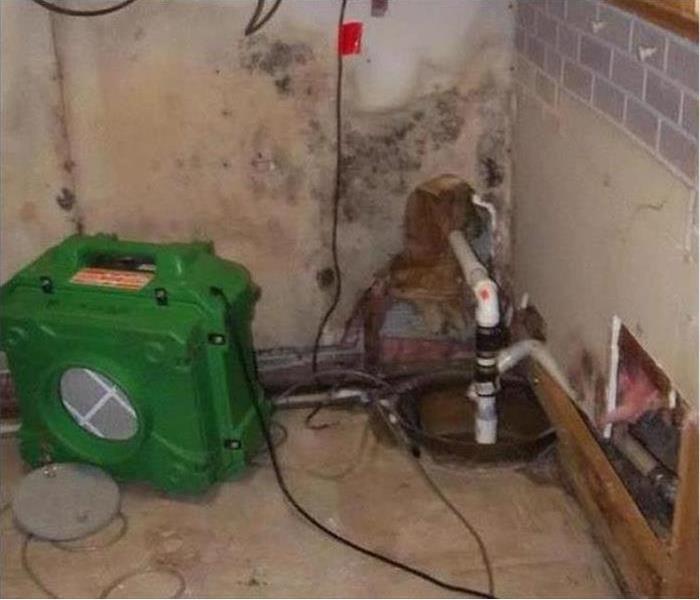 Water damage can cause mold to develop if not treated quickly by a professional. Call SERVPRO of Bartow Lakeland Highlands at 863-510-5962.
Water damage can cause mold to develop if not treated quickly by a professional. Call SERVPRO of Bartow Lakeland Highlands at 863-510-5962.
Here are the top five key facts you need to know about water damage restoration:
1. Get in Touch with Your Insurance Carrier
Contact your insurance carrier as soon as you discover water damage. They will offer you guidance on how to stop the spread of water damage. They may also be capable of covering part of the damages, lowering the cost of water damage restoration.
If you fail to notify your insurance company quickly, you may be held more liable for the cost. Even if you are unsure whether your insurance provider covers water damage, give them a call nonetheless to find out.
2. Make Sure Your Carrier Covers the Damage
If you think your insurance provider will cover all kinds of water damage, you are wrong! Insurance companies are very specific about the coverage and will not cover all types of water damage. Most policies, for example, do not reimburse water damage due to floods. If you reside in a flood-prone region, you may consider purchasing insurance coverage for flood separately.
Do not be surprised if your insurance company tells you that your policy has not protected your water damage. Most house insurance policies do not cover all types of damage. For this reason, being cautious with your insurance might benefit you in the long run.
3. Treat the Water Damage in Time
The importance of timing in a successful repair cannot be overstated. If you wait too long to restore the water damage, you might end up paying hundreds, if not thousands, of dollars more. Water damage might spread, resulting in mold growth or decay.
Mold develops quickly, which contributes to the importance of time. Mold may grow in just 24 hours if moisture is present. Because mold moves quickly, you must move quickly as well.
4. Water Damage Is Not Only What It Looks Like
Many individuals believe that after the water has dried, their problems are over. But the fact is that another issue starts right after that. Unaware of the after-effects of water damage, people tend to solve the issue themselves, and it only gives rise to bigger and costly issues in the long run.
Drying the walls and floors is not enough because you need to remove the excess/increased moisture that has seeped through the walls and floors, which is a favorable environment for mold growth.
Moisture might collect further unless you are proactive in assisting the water in drying. This might cause rot or mold to grow on your property. Mold is hazardous to human health, and it is extremely difficult to treat due to its rapid spread.
Even if you believe the moisture will evaporate, it is advisable to hire an experienced drying service provider to safeguard your house because it will evaporate only from the surface and weaken the walls. Leaving it will make you regret it big time!
5. Every Damage Has a Unique Solution
Many individuals attempt to repair water damage because they consider it a normal water spill – except it’s not! This move results in a bigger issue that causes more damage to their property. This is because not everything can be treated in the same way. Some materials are absorbent, whereas others are difficult to work with. As a result, they require specialized maintenance in the event of water damage.
Call the professionals at SERVPRO of Bartow Lakeland Highlands for immediate response 24 hours a day, 7 days a week at 863-510-5962.
Home Water Damage: What to Do First
3/1/2022 (Permalink)
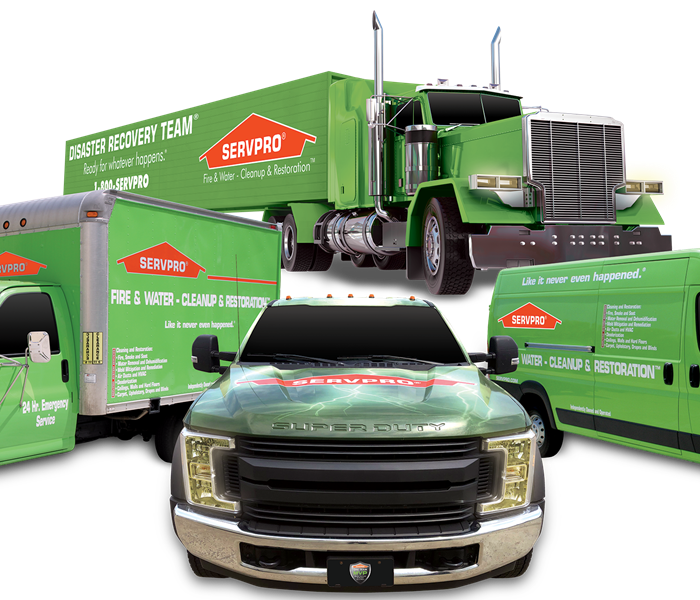 When water damage happens, call SERVPRO of Bartow Lakeland Highlands at 863-510-5962.
When water damage happens, call SERVPRO of Bartow Lakeland Highlands at 863-510-5962.
After any home emergency, the safety of your family is most important. In the case of water damage, the actions below are some things you can do while waiting for assistance. However, it’s best to do only those things you know you can do safely. Once we arrive, we’ll help you assess the situation further and take action to prevent additional damage to your property.
- Shut off the water source if possible, or contact a qualified party to stop the source.
- Turn off circuit breakers for wet areas of the home when access to the panel is safe.
- Remove as much excess water as possible by mopping and blotting.
- Remove and prop up wet upholstery cushions for even drying.
- Move any paintings, art, computers, documents, or other sensitive valuables to a dry place.
- Don't use your household vacuum cleaner to remove water, this could result in electric shock.
Call SERVPRO of Bartow Lakeland Highlands for immediate professional response to your water damage needs.
Faster to Any Size Disaster
1/2/2022 (Permalink)
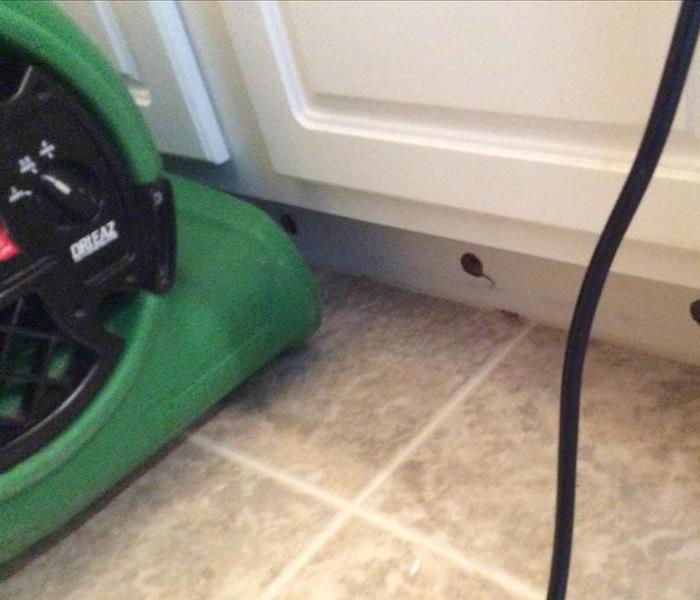 Our professional air mover drying cabinets.
Our professional air mover drying cabinets.
Water damage can occur for many reasons. The most common causes in Florida homes are faulty plumbing, leaking appliances, or roof leaks.
If you experience water damage in your home, a fast, professional response from SERVPRO of Bartow Lakeland Highlands is a phone call away.
Our water damage technicians are trained to remediate damages quickly and professional following all current standards and guidelines. They are IICRC certified, background checked, insured, and are provided with continuing education regularly.
If you experience a water leak, call SERVPRO of Bartow Lakeland Highlands any time day or night. Our phones are answered 24/7 365 days a year.
Our response is immediate and our technicians always available to help. With professional equipment, the right steps can reduce damages to your home saving you money and repairs.
SERVPRO of Bartow Lakeland Highlands prides itself on customer service and fast professional response. Call 863-510-5962 if you have water damages.



 24/7 Emergency Service
24/7 Emergency Service





